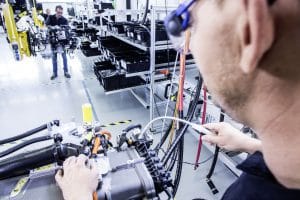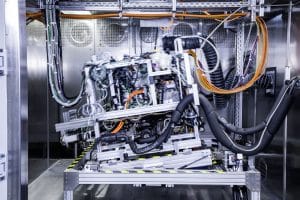
The fledgling fuel-cell partnership between Daimler Truck AG and Volvo AB is preparing to test its technology before the end of the year in a project with Rolls-Royce plc.
The objective is to demonstrate emission-free alternatives to diesel engines, which are currently used as emergency power generators or to cover peak loads. Initially, the plan calls for Daimler and Rolls-Royce to cooperate on using stationary fuel-cells as carbon dioxide-neutral emergency power generators for safety-critical facilities such as data centers, Daimler officials said in announcing the new venture.
“For Daimler Truck AG, fuel-cell systems play a decisive role in achieving carbon dioxide-neutral transport – as a supplement to battery-electric drive, noted Martin Daum, chairman of the Board of Management of Daimler Truck AG and Member of the Board of Management of Daimler AG.
(Daimler, Volvo to join forces on fuel-cell development.)
At the end of April, Daimler Truck established a joint venture with the Volvo Group. With the agreement for stationary fuel-cell systems concluded, we are already demonstrating very concrete opportunities for the commercialization of this technology through the joint venture, Daum said.

“We are delighted that Rolls-Royce is as convinced as we are of the future of fuel cells in the stationary sector and would like to enter into this long-term cooperation with us,” added Daum, noting the new venture with Rolls-Roycle represents further impetus for the development of a “hydrogen infrastructure” required by fuel-cells.
Daum said the collaboration will further increase the economy of fuel cells, as well as the acceptance of and public confidence in the technology.
Daimler Truck AG and the Volvo Group signed a preliminary agreement to establish a new joint venture for the large-scale development, production and commercialization of fuel-cell systems for heavy-duty commercial vehicles and other applications.
Daimler Truck AG, which has taken responsibility for fuel-cell development for the Daimler Group, and the Volvo Group plan to start large-scale production of heavy-duty fuel-cell commercial vehicles for demanding and heavy long-haul applications in the second half of the decade.
(Daimler, Volvo pondering potential engine partnership.)
However, the fuel-cell systems for stationary applications can be produced in series by the planned joint venture between Daimler Truck AG and the Volvo Group at an earlier stage, as the specific requirements for use in transport on public roads do not apply, Daum said.

The Rolls-Royce Power Systems business unit plans to rely on these fuel-cell systems from the planned joint venture – as well as Daimler’s many years of experience – in the emergency power generators it develops and distributes for data centers under the MTU product and solution brand.
“Data centers are the nodes of the global information and communication network, whose vital importance has become particularly clear in these difficult times and whose operation must therefore be reliably safeguarded. The same applies to other safety-critical systems,” said Andreas Schell, CEO of Rolls-Royce Power Systems.
Schell said the decarbonization of drive systems and power supply is one of our central strategic goals and fuel cells will play a key role in this.
“No other technology offers such high reliability, modular scalability and all the advantages of renewable energies without dependence on the conventional energy market. Through the cooperation with Daimler Trucks, we will gain access to fuel-cell systems that meet our demanding requirements and will thus further strengthen our outstanding position in this growth market,” Schell said.
During the past two decades, Daimler has developed considerable knowledge in fuel-cell technology with its site in Nabern, Germany (currently the headquarters of Mercedes-Benz Fuel Cell GmbH) and other production and development facilities in Germany and Canada.
(Daimler expands customer experience electric truck fleet.)
In order to enable the joint venture with the Volvo Group, Daimler Trucks is bringing together all of the Daimler Group’s fuel-cell activities, including assets from Mercedes-Benz, in a new fuel-cell entity and will place them in the planned joint venture.







